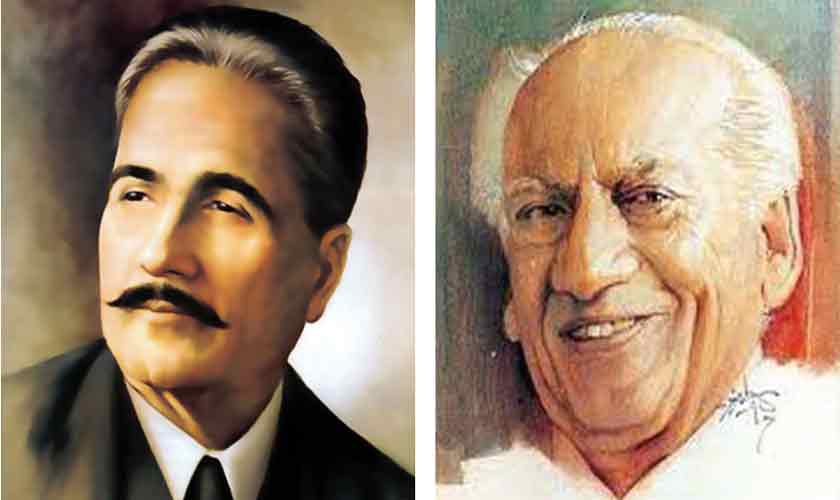
F aiz Ahmed Faiz and Muhammad Iqbal were both born in Sialkot district. However, with the redrawing of district boundaries, Kala Kader, where Faiz was born, now falls in the Narowal district. Both initially attended school and college in Sialkot before moving on to Government College in Lahore.
Iqbal was born on the 9th of November; Faiz passed away on the 20th of November. Faiz’s death and birth anniversaries are typically observed by private organisations, unlike those of Iqbal, which are often held under state patronage. Initially, the 21st of April was observed as a state occasion and a public holiday.
Later, this was switched to Iqbal’s birth anniversary, the ninth of November. However, this date was eventually scrapped as a public holiday but has been sporadically reinstated in the past few years. Before the day arrives, there is often much speculation about whether it will be a public holiday or not.
Iqbal’s poetry has been sung by the country’s leading vocalists. The first to take advantage of his kalaam were the qawwals . Likely after the creation of Pakistan, the qawwals made Shikwa and Jawab-i-Shikwa part of the standard qawwali repertoire, with Jawab-i-Shikwa appearing to have the upper hand in the debate.
This approach pleased everyone without ruffling too many feathers. Faiz has been rendered musically in a much more satisfactory fashion than Iqbal. All the leading vocalists have interpreted his work.
Some pieces have become great music in the process. This is especially satisfying because Faiz was at one stage s a persona non grata and not permitted to be broadcast on state media. At that time, radio was the principal medium for wide-reaching dissemination.
While many poets and vocalists were allowed airtime, Faiz was excluded. Mujh Say Pehli Si Mohabbat Meray Mehboob Na Maang became an instant favourite as soon as it was sung, much like the poem which had already gained popularity when read or published. Mehdi Hassan’s rendition of Gulon Mein Rang Bharay, Baad-i-Naubahar Chalay is now regarded as a classic in ghazal gaiki .
Faiz has been rendered musically in a much more satisfactory fashion than Iqbal. During the martial law period under Yahya Khan, especially around the time elections were announced, Faiz’s work made it to the radio and television. When Pakistan Peoples Party came into power, all restrictions on him were lifted, only to be re-imposed after martial law was enforced by Zia-ul Haq.
By then, many memorable compositions of Faiz’s poetry had been created and had become hugely popular. This included Dasht-i-Tanhai Mein , composed by Mehdi Zaheer and rendered by Iqbal Bano; along with ghazal s sung by Farida Khanum and Nayyara Noor. These renditions lifted the fear of being caught broadcasting or listening to someone who had once been ruthlessly censored.
One gets the sense that Iqbal’s work has not been sung with the same mastery that marks the highest levels of vocal music. It is difficult to say why this is the case, even though some of the leading figures in their fields have composed and sung his work. It could be argued that the declamatory style or tone of much of Iqbal’s verse does not lend itself well to musical composition and the lagao of the sur , as it is traditionally appreciated.
Since the state has backed Iqbal, every possible means has been used to promote his work, but the results have not been commensurate. It could be that Iqbal is treated with too much veneration, stifling the emergence of something of artistic value. Perhaps some irreverence, challenges, reservations or misgivings are necessary for the creative process to take hold.
Someone may appear in the future who treats Iqbal on his own terms, casting aside the cloak of veneration. This bold approach might open new avenues for Iqbal’s work to be rendered musically and freely hummed across the country, like the ghazal s and nazm s by other poets that have broken barriers and gained widespread popularity. The author is a culture critic based in Lahore.














